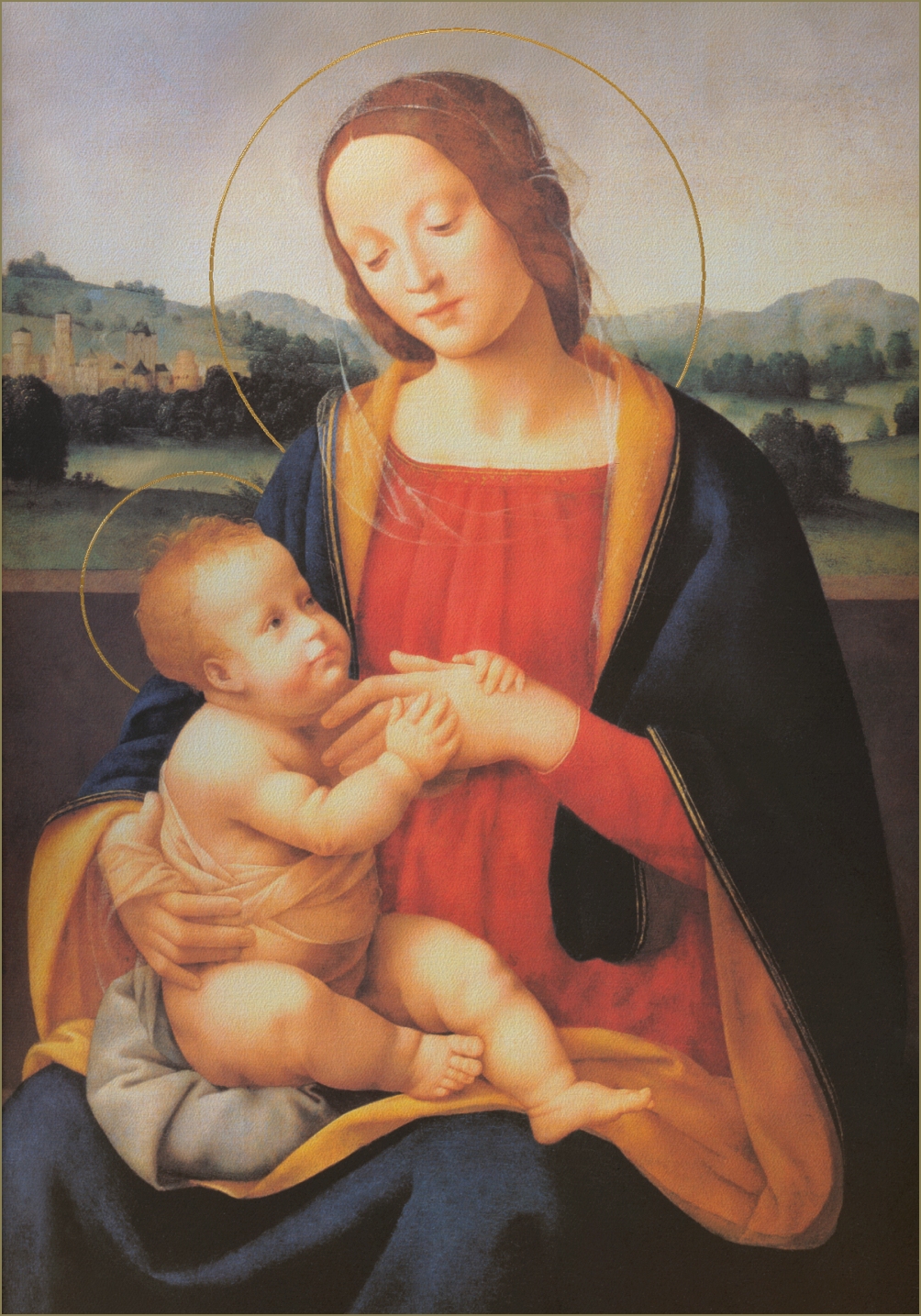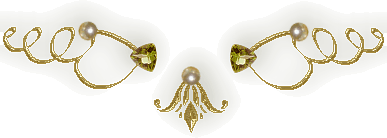
Madonna and Child
SOGLIANI
1492-1544


Excerpt From
The Glories of Mary
St. Alphonsus de Liguori
Redemptorist Fathers, 1931
with Nihil Obstat and Imprimatur
Published on the Web with Permission
Mary, Our Life, Our Sweetness
II. Mary is also our Life, Because She Obtains for Us Perseverance.
Final perseverance is so great a gift of God, that (as it was declared by the holy Council of Trent) it is quite gratuitous on His part, and we cannot merit it. Yet we are told by St. Augustine, that all who seek for it obtain it from God; and, according to Father Suarez, they obtain it infallibly, if only they are diligent in asking for it to the end of their lives. For, as Bellarmine well remarks, "that which is daily required must be asked for every day." Now, if it is true (and I hold it as certain, according to the now generally received opinion) that all the graces that God dispenses to men pass through the hands of Mary, it will be equally true that it is only through Mary that we can hope for this greatest of all graces-----perseverance. And we shall obtain it most certainly if we always seek it with confidence through Mary. This grace she herself promises to all who serve her faithfully during life, in the following words of Ecclesiasticus, and which are applied to her by the Church, on the feast of her Immaculate Conception: " They that work by me shall not sin. They that explain me shall have life everlasting." [Ecclus. 24:30]
In order that we may be preserved in the life of grace, we require spiritual fortitude to resist the many enemies of our salvation. Now this fortitude can be obtained only by the means of Mary, and we are assured of it in the Book of Proverbs, for the Church applies the passage to this most blessed Virgin.
"Strength is mine; by me kings reign;" [Prov. 8:14] meaning by the words "strength is mine" that God has bestowed this precious gift on Mary, in order that she may dispense it to her faithful clients. And by the words " by me kings reign" she signifies that by her means her servants reign over and command their senses and passions, and thus become worthy to reign eternally in Heaven. Oh, what strength do the servants of this great Lady possess to overcome all the assaults of Hell! Mary is that tower spoken of in the sacred Canticles: "Thy neck is as the tower of David, which is built with bulwarks; a thousand bucklers hang upon it, all the armor of valiant men." [Cant. 4:4] She is as a well-defended fortress in defense of her lovers, who in their wars have recourse to her. In her do her clients find all shields and arms to defend themselves against Hell.
And for the same reason the most blessed Virgin is called a plane-tree in the words of Ecclesiasticus: "As a plane-tree by the water in the streets was I exalted." [Ecclus. 24:19] Cardinal Hugo explains them, and says that the "plane-tree has leaves like shields," to show how Mary defends all who take refuge with her. Blessed Amedeus gives another explanation, and says that this holy Virgin is called a plane-tree because, as the plane shelters travelers under its branches from the heat of the sun and from the rain, so do men find refuge under the mantle of Mary from the ardor of their passions and from the fury of temptations. Truly are those souls to be pitied who abandon this defense, in ceasing their devotion to Mary, and no longer recommending themselves to her in the time of danger. If the sun ceased to rise, says St. Bernard, how could the world become other than a chaos of darkness and horror? And applying this question to Mary, he repeats it. "Take away the sun, and where will be the day? Take away Mary, and what will be left but the darkest night?" When a soul loses devotion to Mary it is immediately enveloped in darkness, and in that darkness of which the Holy Ghost speaks in the Psalms: "Thou hast appointed darkness, and it is night; in it shall all the beasts of the woods go about." [Ps. 103:20] When the light of Heaven ceases to shine in a soul, all is darkness, and it becomes the haunt of devils and of every sin. St. Anselm says, that "if anyone is disregarded and condemned by Mary, he is necessarily lost," and therefore we may with reason exclaim, "Woe to those who are in opposition to this sun!" Woe to those who despise its light! that is to say, all who despise devotion to Mary.
St. Francis Borgia always doubted the perseverance of those in whom he did not find particular devotion to the Blessed Virgin. On one occasion he questioned some novices as to the Saints towards whom they had special devotion, and perceiving some who had it not towards Mary, he instantly warned the Master of novices, and desired him to keep a more attentive watch over these unfortunate young men, who all, as he had feared, lost their vocation and renounced the religious state.
It was, then, not without reason that St. Germanus called the most blessed Virgin the breath of Christians; for as the body cannot live without breathing, so the soul cannot live without having recourse to and recommending itself to Mary, by whose means we certainly acquire and preserve the life of Divine grace within our souls. But I will quote the Saint's own words: "As breathing is not only a sign but even a cause of life, so the name of Mary, which is constantly found on the lips of God's servants, both proves that they are truly alive, and at the same time causes and preserves their life, and gives them every succor."
Blessed Allan was one day assaulted by a violent temptation, and was on the point of yielding, for he had not recommended himself to Mary, when the most blessed Virgin appeared to him; and in order that another time he might remember to invoke her aid, she gave him a blow, saying," If thou hadst recommended thyself to me, thou wouldst not have run into such danger."
On the other hand, Mary says in the following words of the Book of Proverbs, which are applied to her by the Church: "Blessed is the man that heareth me, and that watcheth daily at my gates, and waiteth at the posts of my doors," [Prov. 8:34]-----as if she would say, Blessed is he that hears my voice and is constantly attentive to apply at the door of my mercy, and seeks light and help from me. For clients who do this Mary does her part, and obtains them the light and strength they require to abandon sin and walk in the paths of virtue. For this reason Innocent III beautifully calls her "the moon at night, the dawn at break of day, and the sun at midday." She is a moon to enlighten those who blindly wander in the night of sin, and makes them see and understand the miserable state of damnation in which they are; she is the dawn (that is, the forerunner of the sun) to those whom she has already enlightened, and makes them abandon sin and return to God, the true sun of justice; finally, she is a sun to those who are in a state of grace, and prevents them from again falling into the precipice of sin.
Learned writers apply the following words of Ecclesiasticus to Mary: "Her bands are a healthful binding." [Ecclus. 6:31] "Why bands," asks St. Laurence Justinian, "except it be that she binds her servants, and thus prevents them from straying into the paths of vice?" And truly this is the reason for which Mary binds her servants. St. Bonaventure also, in his commentary on the words of Ecclesiasticus, frequently used in the office of Mary, "My abode is in the full assembly of Saints," [Ecclus. 24:16] says that Mary not only has her abode in the full assembly of Saints, but also preserves them from falling, keeps a constant watch over their virtue, that it may not fail, and restrains the evil spirits from injuring them. Not only has she her abode in the full assembly of the Saints, but she keeps the Saints there, by preserving their merits, that they may not lose them, by restraining the devils from injuring them, and by withholding the arm of her Son from falling on sinners.
In the Book of Proverbs we are told that all Mary's clients are clothed with double garments. "For all her domestics are clothed with double garments." [Prov. 31:21] Cornelius à Lapide explains what this double clothing is: he says that it "consists in her adorning her faithful servants with the virtues of her Son and with her own," and thus clothed they persevere in virtue.
Therefore St. Philip Neri, in his exhortations to his penitents, used always to say: "My children if you desire perseverance, be devout to our blessed Lady." The Venerable John Berchmans, of the Society of Jesus, used also to say: "Whoever loves Mary will have perseverance." Truly beautiful is the reflection of the Abbot Rupert on this subject in his commentary on the parable of the prodigal son. He says, "That if this dissolute youth had had a mother living, he would never have abandoned the paternal roof, or at least would have returned much sooner than he did;" meaning thereby that a son of Mary either never abandons God, or, if he has this misfortune, by her help he soon returns.
Oh, did all men but love this most benign and loving Lady, had they but recourse to her always, and without delay, in their temptations, who would fall? Who would ever be lost? He falls and is lost who has not recourse to Mary. St. Laurence Justinian applies to Mary the words of Ecclesiasticus, "I have walked in the waves of the sea; [Ecclus. 24:8] and makes her say, "I walk with my servants in the midst of the tempests to which they are constantly exposed, to assist and preserve them from falling into sin."
Bernardine de Bustis relates that a bird was taught to say, "Hail, Mary!" A hawk was on the point of seizing it, when the bird cried out, "Hail, Mary!" In an instant the hawk fell dead. God intended to show thereby that if even an irrational creature was preserved by calling on Mary, how much more would those who are prompt in calling on her when assaulted by devils be delivered from them. We, says St. Thomas of Villanova, need only, when tempted by the devil, imitate little chickens, which, as soon as they perceive the approach of a bird of prey, run under the wings of their mother for protection. This is exactly what we should do when ever we are assaulted by temptation: we should not stay to reason with it, but immediately fly and place ourselves under the mantle of Mary. I will, however, quote the Saint's own words addressed to Mary: "As chickens when they see a kite soaring above run and find refuge under the wings of the hen, so are we preserved under the shadow of thy wings. And thou," he continues, "who art our Lady and Mother, hast to defend us; for after God we have no other refuge than thee, who , art our only hope and our protectress; towards thee we all turn our eyes with confidence." Let us, then, conclude in the words of St. Bernard: "O man, whoever thou art, understand that in this world thou art tossed about on a stormy and tempestuous sea, rather than walking on solid ground; remember that if thou wouldst avoid being drowned thou must never turn thine eyes from the brightness of this star, but keep them fixed on it, and call on Mary. In dangers, in straits, in doubts, remember Mary, invoke Mary." Yes, in dangers of sinning, when molested by temptations, when doubtful as to how you should act, remember that Mary can help you; and call upon her, and she will instantly succor you. "Let not her name leave thy lips, let it be ever in thy heart. Your hearts should never lose confidence in her holy name, nor should your lips ever cease to invoke it. "Following her, thou wilt certainly not go astray." Oh, no, if we follow Mary, we shall never err from the paths of salvation. "Imploring her, thou wilt not despair." Each time that we invoke her aid, we shall be inspired with perfect confidence. "If she supports thee, thou canst not fall;" "if she protects thee, thou hast nothing to fear, for thou canst not be lost;" "with her for thy guide, thou wilt not be weary, for thy salvation will be worked out with ease." "If she is propitious, thou wilt gain the port." If Mary undertakes our defense we are certain of gaining the kingdom of Heaven. "This do, and thou shalt live."

 E-Mail
E-Mail
HOME-------------------------------------MARY'S INDEX
www.catholictradition.org/Mary/mary9b.htm